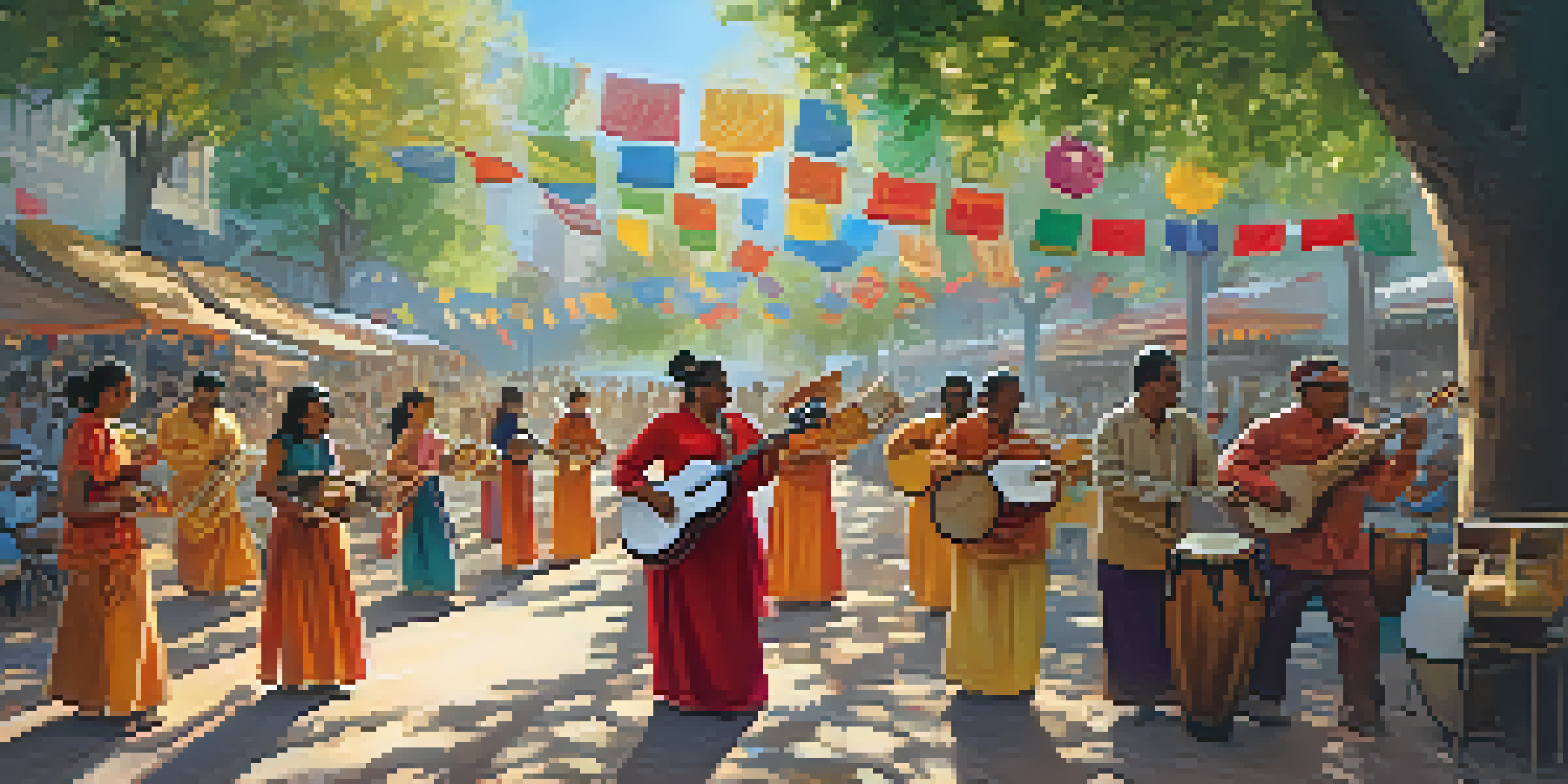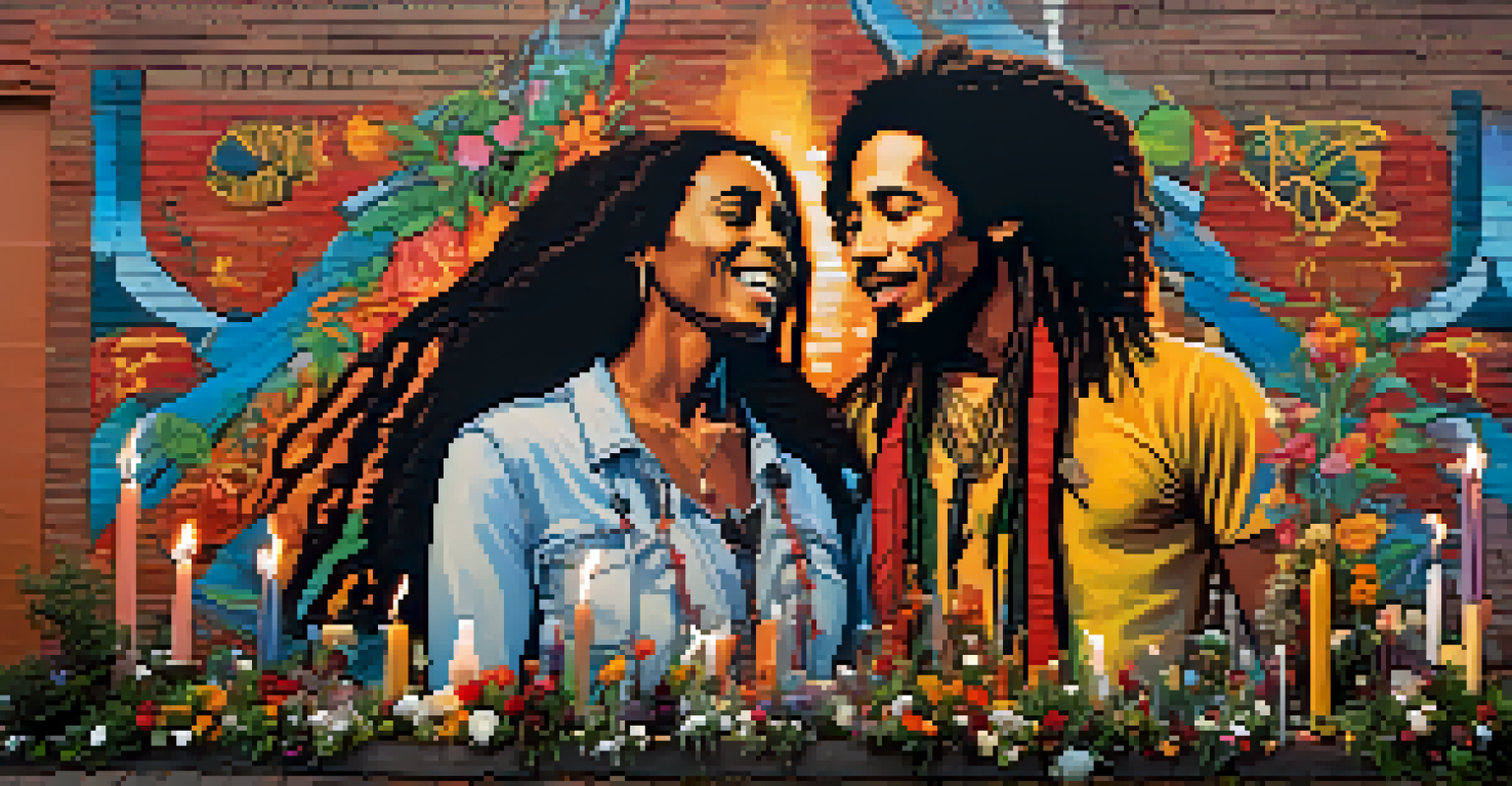Music as an Expression of Resistance in Oppressed Cultures

The Role of Music in Cultural Identity and Resistance
Music serves as a vital expression of cultural identity, especially in oppressed communities. It reflects the values, struggles, and aspirations of a culture, acting as a reminder of their heritage. For many, the melodies and lyrics become a rallying cry, uniting individuals in their shared experiences of resistance.
Music can change the world because it can change people.
In times of oppression, music can transform into a powerful form of protest. It becomes a way to voice dissent against injustices while instilling hope and courage among those who listen. This connection can be seen in various cultures, where songs echo the collective pain and resilience of the people.
Take the example of the Civil Rights Movement in the United States, where songs like 'We Shall Overcome' became anthems of hope and determination. Such music not only inspired action but also helped to forge a sense of community among those fighting for equality.
Historical Examples of Music as Resistance
Throughout history, music has played a crucial role in resistance movements across the globe. From the anti-apartheid struggle in South Africa, where songs like 'Nkosi Sikelel' became symbols of the fight for freedom, to the Latin American nueva canción movement, music has often served as a voice for the voiceless.

These historical examples demonstrate how music can encapsulate the desires and struggles of a people. The rhythms and lyrics often resonate with the lived experiences of oppression, making them powerful tools for mobilization and solidarity.
Music as Cultural Identity
Music serves as a vital expression of cultural identity and resistance, reflecting the values and struggles of oppressed communities.
In many cases, musicians themselves have become symbols of resistance, using their platforms to advocate for change. Artists like Bob Marley and Joan Baez used their music not only to entertain but also to educate and inspire action against systemic injustices.
The Emotional Power of Music in Resistance
Music has a unique ability to evoke emotions, making it a potent tool for resistance. The melodies can stir feelings of anger, sadness, and ultimately, hope, providing a soundtrack to the struggles faced by oppressed communities. This emotional connection often fuels the motivation to resist and fight for justice.
The only way to deal with this is to make music that speaks to the heart of the matter.
For instance, during the Arab Spring, songs like 'Raise Your Voice' captured the spirit of revolution, resonating deeply with those yearning for change. The emotional weight of such music helped to galvanize protests and unify individuals in their quest for freedom.
Moreover, music can serve as a form of therapy, helping individuals cope with trauma and loss. In this way, it becomes a healing force, enabling communities to process their experiences while simultaneously reinforcing their resolve to resist.
Music as a Medium for Political Commentary
Many artists use their music as a platform for political commentary, shining a light on social injustices. By weaving messages of resistance into their lyrics, musicians can challenge the status quo and provoke thought among their listeners. This form of expression is particularly potent in cultures facing oppression.
Consider the work of rapper Kendrick Lamar, whose lyrics often address systemic racism and inequality. His music not only entertains but also educates, prompting listeners to engage with critical social issues. This intersection of art and activism is a powerful aspect of music's role in resistance.
Emotional Power of Protest Music
The emotional weight of music evokes feelings that inspire action and unity, making it a powerful tool for resistance.
In this way, music becomes a form of storytelling that preserves history while advocating for change. It offers a lens through which listeners can understand the struggles of others, fostering empathy and encouraging collective action.
The Global Language of Music in Resistance Movements
One of the remarkable aspects of music is its ability to transcend cultural and linguistic barriers. Regardless of where one comes from, the rhythms and emotions conveyed through music can resonate with anyone, making it a universal language of resistance. This quality fosters solidarity among diverse groups fighting against oppression.
For example, during the global protests for Black Lives Matter, music from various cultures was shared and embraced, highlighting the shared struggle against racial injustice. This cross-cultural exchange reinforces the idea that resistance is a collective endeavor that spans borders.
Furthermore, digital platforms have enabled artists to reach wider audiences, amplifying their messages of resistance. Songs that speak to the struggles of one community can inspire action in another, creating a powerful network of solidarity through music.
The Impact of Technology on Music and Resistance
With the rise of technology, music has evolved into a tool for resistance in new and impactful ways. Social media platforms enable artists to share their messages instantly, reaching audiences far beyond traditional boundaries. This accessibility has transformed how music is used in resistance movements, making it easier for voices to be heard.
For instance, during protests, live-streamed performances can rally support and create a sense of community among participants. The ability to share music quickly online means that songs can spread virally, inspiring movements and amplifying calls for change.
Technology Amplifies Musical Resistance
Advancements in technology allow artists to share their messages instantly, enhancing the impact of music in resistance movements.
Additionally, technology allows for innovative collaborations, where artists from different backgrounds can come together to create music that speaks to shared struggles. This interconnectedness enhances the power of music as a mobilizing force in the fight against oppression.
The Future of Music and Resistance
As we look to the future, the role of music in resistance will likely continue to evolve. New genres and styles may emerge, reflecting the changing landscape of social justice movements. Artists will continue to harness the power of music to challenge oppression and inspire future generations to take action.
Moreover, with the increasing importance of mental health awareness, music may also play a vital role in healing and empowerment within oppressed communities. As individuals confront their own struggles, music can provide solace and a sense of belonging, reinforcing the idea that they are not alone.

Ultimately, the future of music in resistance is bright as artists and communities unite to create a world where justice and equality prevail. The melodies of resistance will echo through time, reminding us of the power of music in the fight for a better tomorrow.